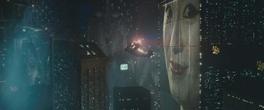1980s
Blade Runner (1982)
 The movie asks whether we ought to extend ethical consideration to replicants when we know they are machines and when Deckard must use a complicated Voight-Kampf empathy test to try to detect them, i.e. when Tyrell designs them to be "more human than human." Includes replicants, an intricate empathy test, an Esper picture analyzer, genetic engineering (eyes, tiny logos), massive advertising (airships, moving images), and hover crafts/flying cars.
The movie asks whether we ought to extend ethical consideration to replicants when we know they are machines and when Deckard must use a complicated Voight-Kampf empathy test to try to detect them, i.e. when Tyrell designs them to be "more human than human." Includes replicants, an intricate empathy test, an Esper picture analyzer, genetic engineering (eyes, tiny logos), massive advertising (airships, moving images), and hover crafts/flying cars.
Blade Runner is dense with SF gems and it has a strong sense of realism. None of the technology is anthropomorphized, which would horrify Disney or viewers who demand an emotional center to help them make a connection to the characters (some critics make the same argument against the Matrix trilogy and the whole of SF).
Its repeated eye imagery represents the "Orwellian eye" of powerful industrial giants, according to Ridley Scott. He aptly argues that corporations could be just as controlling as governments (DVD commentary). But it seems more likely to me that it should symbolize Orwellian governments, at least in the current climate.
But Blade Runner succeeds in imagining a world resourceful enough to engineer advanced androids. We see the specialization of scientists and all sorts of moral, political, and philosophical problems associated with human-android relations. Some of its philosophical questions have been influential for movies concerned with arguing that the defining features of our humanity are murky (especially the Ghost in the Shell movies).
Ridley Scott achieves an excellent portrayal of a futuristic cityscape with a unique and compelling vision of the future on Earth. It influenced many SF authors, such as William Gibson, who says he had to run off to rewrite his book, Neuromancer, after seeing the film since it looked so much better than anything in his book (Interview for The Sci-Fi Files).
Starring: Harrison Ford, Rutger Hauer, Sean Young, Edward James Olmos, Daryl Hannah. Based on a novel by Philip K. Dick (P.K.D.): Do Androids Dream of Electric Sheep?. Directed by Ridley Scott.
Sources: IMDb | RT | MRQE | Wikipedia | Wikia | Technovelgy / News| Screenplay
Links: Google Directory | The Replicant Site | Blade Zone | BR Mag | Philip K. Dick
Star Trek II: Wrath of Khan (1982)
Kirk battles the genetically advanced Khan and learns about the genesis project.
Starring: William Shatner, Leonard Nimoy, DeForest Kelley, Ricardo Montalban, James Doohan, George Takei, Nichelle Nichols, Walter Koenig. Based on Star Trek (TOS) Episode 24: "Space Seed", 1967. Directed by Nicholas Meyer.
Sources: IMDb | RT | MRQE | Wikipedia | Wikia | Script
The Thing (1982)
Paranoia is let loose when aliens are found to be genetic mimickers and body invaders of any species. In some ways it is closer to John W. Campbell's Who Goes There? than the original movie. The arctic locations are nicely atmospheric and the all male cast is noteworthy, but (like the original) it doesn't fully develop an interesting back story to the alien. The SF elements pose fascinating possibilities: an alien could seed other planets, invade and mimic diverse species, and either quickly learn about them (to transmit data back home) or increase their chances of survival. But the idea is vague on how alien explorers -- just on the basis of their genetics -- could know to send back information to their home world (migration type habits seem implausible at such a great distance).
Starring: Kurt Russell. Screenplay by Bill Lancaster. Based on John W. Campbell's "Who Goes There?". Directed by John Carpenter.
Sources: IMDb | RT | MRQE | Wikipedia | Script
TRON (1982)
 A game designer is digitized and downloaded into a video game world. Includes the legendary SF creation -- the Master Control Program (or, perhaps, just my personal vote for most power hungry computer program), which was created by no one single person -- and the security Tron program and a far-fetched digitizing machine. It portrays programs that are skeptical of intelligent design and place faith in 'users' while battling an MCP (master control program) that is intent on total domination.
A game designer is digitized and downloaded into a video game world. Includes the legendary SF creation -- the Master Control Program (or, perhaps, just my personal vote for most power hungry computer program), which was created by no one single person -- and the security Tron program and a far-fetched digitizing machine. It portrays programs that are skeptical of intelligent design and place faith in 'users' while battling an MCP (master control program) that is intent on total domination.
Like Blade Runner, some, at first, might think that it is slow and tiresome, but after you give it a chance to draw you in, you are likely to appreciate its visual and intelligent aspects. End of line.
Starring: Jeff Bridges. Screenplay by Steven Lisberger. Story by Steven Lisberger, Bonnie MacBird. Directed by Steven Lisberger.
Sources: IMDb | RT | MRQE | Wikipedia | Wikia | Script | Roger Ebert
Links: Google Directory | History of Production
2010 (1984)
Portrays U.S.-Russian tensions during a space mission to investigate HAL 9000 and a lost astronaut (Dave Bowman). Includes the rise of new alien and computer lifeforms.
Starring: Roy Scheider, John Lithgow, Helen Mirren. Screenplay by Peter Hyams. Based on the novel by Arthur C. Clarke. Directed by Peter Hyams.
Sources: IMDb | RT | MRQE | Wikipedia
The Terminator (1984). Terminator 2: Judgment Day (1991).
Portrays a war between men and machines (as in The Matrix), and people/cyborgs use time travel with the intention of altering or preserving future events (contra The Time Machine where the future/past can't be changed), though, we discover that the future ultimately depends on these efforts!
Starring: Arnold Schwarzenegger, Linda Hamilton. T1: Written by James Cameron, Gale Anne Hurd, and based on the works of Harlan Ellison. T2: Written by James Cameron, William Wisher Jr. Directed by James Cameron.
Sources: IMDb | RT | MRQE | Wikipedia | Wikia | Scripts (T1 | T2)
Links: Google Directory | Terminator Files
Back to the Future (1985)
A kid uses a futuristic looking car to travel through time and meet his parents back in 1955. In the excellent ending we briefly learn that Christopher Lloyd's character, Dr. Emmett Brown, also traveled to the future and found a way to run his time traveling car on trash!
Starring: Michael J. Fox, Christopher Lloyd, Lea Thompson. Written by Robert Zemeckis, Bob Gale. Directed by Robert Zemeckis.
Sources: IMDb | RT | MRQE | Wikipedia | Wikia | Script
Links: Google Directory | Misc: Official Site
Brazil (1985)
Creates an impressive and one of a kind futuristic world, with memorable scenes of cosmetic surgery, oppressive bureaucracy (mistakes, red-tape, invasion of privacy), dream fantasies, TV addicted workers, presumed terrorist attacks, torture, and alienation.
Starring: Jonathan Pryce. Screenplay by Terry Gilliam, Tom Stoppard, Charles McKeown. Directed by Terry Gilliam.
Sources: IMDb | RT | MRQE | Wikipedia | Script
Links: Google Directory | Terry Gilliam Files
Aliens (1986). See Alien entry (1979).
The Fly (1986)
Includes teleportation (or travel by computer digitization), gene splicing (it's implausible as depicted, see Kaku's Visions on p. 234), and the process of scientific discovery.
Starring: Jeff Goldblum, Geena Davis. Screenplay by Charles Edward Pogue, David Cronenberg. Based on a short story by George Langelaan. Directed by David Cronenberg.
Sources: IMDb | RT | MRQE | Wikipedia
Robocop (1987)
Robocop finds echoes remaining from his human memories (the director has a mystical interpretation of this, but I didn't follow it), a corporation takes control of city security, and the DVD extras noted that the extreme violence possibly reflects social commentary on the Reagan era. I admit I root for Robocop when he takes the streets!
Starring: Peter Weller, Nancy Allen, Dan O'Herlihy. Written by Edward Neumeier, Michael Miner. Directed by Paul Verhoeven.
Sources: IMDb | MRQE | Wikipedia | Script
Links: Google Directory | Official Site, Robocop Archive
Other 1980s SF and Related Movies
-
 Quick mentions (future possible entries): Android (Dir. Aaron Lipstadt, 1982), Brainstorm (Dir. Douglas Trumbull, 1983), WarGames (Dir. John Badham, 1983), The Adventures of Buckaroo Banzai Across the 8th Dimension (Dir. W. D. Richter, 1984), Electric Dreams (Dir. Steve Barron, 1984), Runaway (Dir. Michael Crichton, 1984), The Quiet Earth (Dir. Geoff Murphy, 1985), Star Trek IV: The Voyage Home (Dir. Leonard Nimoy, 1986).
Quick mentions (future possible entries): Android (Dir. Aaron Lipstadt, 1982), Brainstorm (Dir. Douglas Trumbull, 1983), WarGames (Dir. John Badham, 1983), The Adventures of Buckaroo Banzai Across the 8th Dimension (Dir. W. D. Richter, 1984), Electric Dreams (Dir. Steve Barron, 1984), Runaway (Dir. Michael Crichton, 1984), The Quiet Earth (Dir. Geoff Murphy, 1985), Star Trek IV: The Voyage Home (Dir. Leonard Nimoy, 1986). -
The Lathe of Heaven (1980), Made for TV. George Orr comes out of a nuclear blast zone with the power to create new realities by dreaming. It becomes a story of hubris when his dream doctor, Dr. Haber, attempts to use Orr to create a utopia. It gets very interesting as Orr interprets the doctor's hypnotic suggestions in novel ways. Aliens suddenly populate the Moon, Orr wins a lottery house near the ocean, Dr. Haber gets an institute, humans get the same color skin to help end racism, and more! Starring: Bruce Davison. Based on the novel by Ursula K. Le Guin. Directed by Barzyk & Loxton. Sources: IMDb | RT | MRQE | Wikipedia
 We are looking for people with skills or interest in the following areas:
We are looking for people with skills or interest in the following areas:
